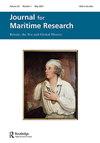Tokens of friendship, tools of diplomacy: buttons and medals in exploration*
Q3 Arts and Humanities
引用次数: 0
Abstract
ABSTRACT To help smooth first and early encounters with indigenous people around the world, European and American explorers often presented gifts to the people whose lands they were exploring. Buttons from naval or military uniforms were sometimes exchanged for food, furs, and other local products. Special medals were also prepared for use on expeditions. These were selectively presented to indigenous leaders or left as tangible records of places “discovered” or visited. This paper discusses and illustrates examples of both kinds of gifts.友谊的象征,外交工具:探索中的按钮和奖章
欧洲和美洲的探险家们为了顺利地与世界各地的土著居民初次接触,经常向他们正在探索的土地上的土著居民赠送礼物。海军或军队制服上的纽扣有时会被用来交换食物、皮草和其他当地产品。还准备了特殊的奖章,以供远征时使用。它们被选择性地呈现给土著领导人,或作为“发现”或访问过的地方的有形记录留下。本文讨论并举例说明了这两种礼物。
本文章由计算机程序翻译,如有差异,请以英文原文为准。
求助全文
约1分钟内获得全文
求助全文
来源期刊

Journal for Maritime Research
Arts and Humanities-History
自引率
0.00%
发文量
0
期刊介绍:
The Journal for Maritime Research ( JMR ), established by the National Maritime Museum in 1999, focuses on historical enquiry at the intersections of maritime, British and global history. It champions a wide spectrum of innovative research on the maritime past. While the Journal has a particular focus on the British experience, it positions this within broad oceanic and international contexts, encouraging comparative perspectives and interdisciplinary approaches. The journal publishes research essays and reviews around 15-20 new books each year across a broad spectrum of maritime history. All research articles published in this journal undergo rigorous peer review, involving initial editor screening and independent assessment, normally by two anonymous referees.
 求助内容:
求助内容: 应助结果提醒方式:
应助结果提醒方式:


